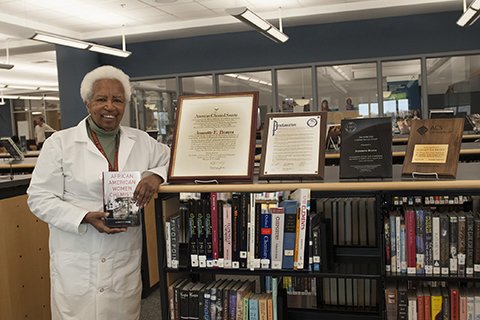Jeannette Brown: Compounding chemicals

Written by Greg Breining
March 2, 2017
Jeannette Brown (Chem M.S. ’58) confounded two stereotypes of scientists—not only was she a woman but, she was also an African-American woman.
Graduating from the University of Minnesota with a master’s in chemistry in 1958, Brown attended in an era when few women or African-Americans entered science.
In her long career as a chemist in the pharmaceutical industry, she was often the only African-American woman in her department. Yet she doesn’t complain that she felt isolated by either race or gender. A bookworm as a child, she was used to working alone, visiting the library across the street to look up science-related subjects. As a child, she moved to Staten Island in New York, where she was one of few black kids in high school.
“I guess because I had grown up in New York with so many white folks, it didn’t bother me because I was used to being alone,” she said. “I’m an only child as well.”
With her degree in organic chemistry, she began applying for work.
Showing up for one interview, “the secretary looked at me and went in to talk to her boss. She came back out and said, ‘Oh, we’re sorry. That job has been filled.’ I was really upset,” Brown said.
Despite that setback, she joined Swiss pharmaceutical company CIBA, where she developed drugs for tuberculosis and coccidiosis, a parasitic disease affecting livestock. In 1969, she moved to Merck Research Laboratories.
“I loved going to work,” Brown said. “I loved working in the lab because I was in control.”
Soon, Brown found herself being a mentor to the increasing number of women coming into the company.
“Being the only black woman, when young women came into the lab, I wound up being the mentor,” she said. “If they had a problem, before I knew it, I would be listening.”
After retiring from Merck, she continued teaching at the New Jersey Institute of Technology, where she also helped recruit black students to enter STEM fields and worked on science education issues in the state.
Since then, she has written a book, entitled African American Women Chemists, and is at work on a second book of profiles. She has also been involved in the leadership of the American Chemical Society and has been a career consultant for the organization.
Brown advises young women entering the scientific fields to plow ahead despite the inevitable slights that will come their way.
“You just got to keep going,” she said. “You can’t stop. If you stop, you’re not going to get what you want.”
“Secondly, go straight for a Ph.D. Do not stop at a master’s degree,” she said. “If you’re a Ph.D., then you’re the boss.”
Finally, she recommends going to a school where “you think you’re going to be happy. The same thing in industry—make sure you find a job where you’re going to be happy, where you’re going to have friends.”
Whether you’re managing employees or recalling the old days with other retirees, good personal relationships are important, she says.
“Why would we have 20 or so of us all eating breakfast together when we’re retired?” she asks. “We still like each other!”
